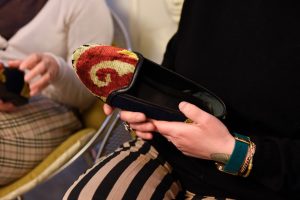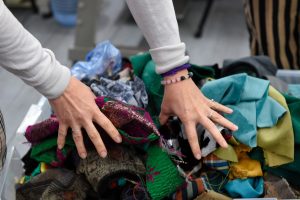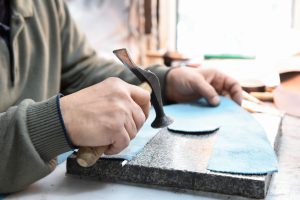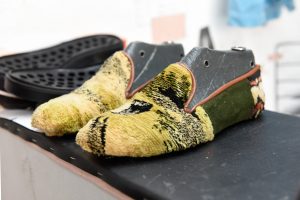
Recycling fabric into shoes – the story of Usuli, a unique brand in the Georgian market
Usuli, a company founded by long-time friends Sopho Lapiashvili and Maka Noselidze, stands out in the Georgian market as a pioneer. The company’s niche is crafting shoes, bags, and accessories from reclaimed materials.
The company faces no direct competition in Georgia, and the idea of eco-friendly shoes crafted from discarded coloured cloths clearly sets Usuli apart on the market. Sopho and Maka shared the founding story of the company.
“During the pandemic, we found ourselves with an abundance of free time. Restricted from venturing out, our social interactions were limited to visiting each other, though only until 9pm. So, we began pondering ways to introduce something new and interesting.
“The idea to start our business originated from having designer friends who often had leftover pieces, fretting over the prospect of discarding them. I offered to take these excess materials off their hands, although at that point we hadn’t quite figured out what we’d do with them. It was then that I proposed to Maka that we could launch something using these remnants. Despite having many different ideas initially, given the small size of the pieces, clothing was swiftly eliminated as an option. Ultimately, we decided on shoes,” Sopho recounts.
This is how Usuli began in December 2020. The company now produces bags and belts, along with colourful shoes.
What does ‘Usuli’ mean?
Sopho also shared the story behind the brand name. She explained that they considered various sources for inspiration, including old books, in their quest to find a memorable, Georgian name.
“I remember how Maka sent me a long list of possible names. We aimed for something meaningful, resonating with the brand’s essence. Eventually, we settled on Usuli. It’s an ancient Georgian word, signifying beauty and charm, with smooth pronunciation. Soon enough, our customers embraced it,” says Sopho.
Key challenge
Actually producing coloured shoes from cloth wasn’t as easy as Sopho and Maka had anticipated. When they embarked on their venture, they encountered resistance from the outset. Finding a shoemaker willing to sew shoes from cloth proved to be a significant challenge.
“Our problem was that shoemakers mostly work with leather. They typically utilise a single pattern cut with special machines, simplifying the sewing process. However, this method isn’t usable for cloth shoes: you can’t use the same method for sewing cloth shoes: each shoe presents unique challenge due to varying fabrics and intricate details, necessitating meticulous hand-sewing. Consequently, no two pairs are exactly alike. When we explained this to the shoemakers, they unanimously declined the offer,” Maka recalls.
“We searched for a shoemaker for 6 months. One of them scoffed, ‘Who has ever heard of sewing shoes from cloth?!’ And left us upset. In the end, we stumbled upon our current sewing shop entirely by chance. I had a tailor on the same street who mentioned they were sewing shoes next door and advised us to look inside. That’s how we ended up here. We’ve been working with these shoemakers for over three years now. Sometimes they grumble because the sewing process itself is challenging, but they also appreciate the end result,” Sopho explains.
First collection
Maka and Sopho initially began selling their shoes on Facebook. Later, they ventured into creating an Instagram account for the brand, and they still actively maintain these two social networks to this day. They also participate in local exhibitions and other similar events.
“During the pandemic, people turned to online shopping to soothe their longing for the in-store experience. It was a form of therapy for them. Our shoe sales thrived, and we were asking each other, ‘Where on earth are all these people strutting around in their new shoes?’” Maka laughs.
The two friends collect the essential fabrics for shoemaking from friendly designers, furniture manufacturing companies and stores. Some people are already aware that the fabric they no longer require could be of use to Usuli, so strangers also bring their cast-offs to the company.
“We created our very first collection from plaids. Initially we simply put out a call, asking anyone with unused plaids to bring them to us. In the end, the story spread like wildfire. We were inundated with plaids – so many, in fact, that we eventually had to put out a message: ‘No more plaids, please’,” Maka recounts.
Usuli in Vilnius
After opening stores in physical space, Usuli experienced a significant decline in sales. It was during this challenging period that a new EU project emerged, presenting a fresh opportunity for Usuli.
Usuli was involved in the ‘Enhancing Export Capacities for Georgian and Estonian SMEs – Export Design’ project, supported by the EU4Business: Connecting Companies (EU4BCC) initiative under the EU4Business umbrella. In 2023, as part of this project, Sopho travelled to Lithuania, joining a mobility programme tailored for creative small and medium-sized enterprises. Spending a month in Vilnius, she was hosted by a Lithuanian company similar to Usuli. With their help, Sopho found a store willing to retail Usuli products in Lithuania.
Within the same project, Sopho Lapiashvili collaborated with a local designer to create a piece that was showcased at Kaunas Design Week. During the concept development work in Lilthuania, Sopho stumbled upon a poem Skami (Chair) by Georgian poet Lia Liqokeli, which became her source of inspiration. As the project revolved around a chair covered in fabrics and Usuli was contemplating how to imbue it with personification, the words of the poem precisely captured the essence of their vision, creating a remarkable alignment between their thoughts and the inspiration they sought.
“During one of our training sessions, we encountered a representative from the Georgian Chamber of Commerce who told us about the EU project. Though we hаd little hope of success, we completed the application and awaited further developments. The project aimed to explore the market of a foreign country and devise strategies for selling our products there, aiming to penetrate new markets. According to the plan, a brand from an EU country similar to ours was expected to extend an invitation. Eventually, we received the invitation to Vilnius, and I embarked on a month-long journey.
“For me it was a very interesting and useful experience. That company was also eco-friendly, specialising in the recycling of jeans. Visiting their premises exposed me to a different facet of our work, for example, I attended educational workshops, witnessed at first-hand how designers collaborated with one another. All of this expanded our perspective,” says Sophо.
Plans for the future
The founders of Usuli are also open to collaborating with other companies. For instance, they have teamed up with designers specialising in typography. Through this partnership, they developed several models featuring various iterations of the letter ‘U’.
Usuli primarily sells its products online, though it also collaborates with various stores. Recently, the company entered the American market, dispatching 100 pairs of shoes and 65 bags for sale to a cafe in New York. Looking ahead, they aim to explore additional export avenues and open their own store in Georgia.
Sopho and Maka firmly believe that the cornerstone of their brand’s strength lies in its eco-friendliness. They acknowledge that alongside financial constraints, their primary challenge stems from the lack of awareness in society regarding the significance of recycled clothing. But ultimately, Usuli has overcome numerous challenges, a fact that fills its founders with particular pride as they chart the brand’s future trajectory with unwavering enthusiasm.
Author: Anano Didebashvili
The article published in Georgian by On.ge



